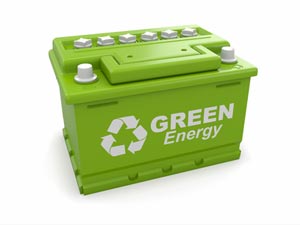To select the right batteries for a standard solar system, there are five things you need to consider:
- Availability – some suppliers may not stock all solar battery types
- Purchase cost – how much you can spend can make a big difference
- Battery lifespan – some battery types last longer than others
- Safety – some battery types are safer than others
- Maintenance – some solar battery types require more maintaining

Marine Deep Cycle Batteries
As the name implies, this battery solar system is designed for use in boats. The batteries contain lead and sulfuric acid, a toxic and corrosive combination. They are not strong batteries and have a relatively short service life compared to the other types.
The other issue with these lead-acid batteries is that they emit toxic and flammable gas when charging, making them unsuitable for indoor use. They may also require more maintenance. The usual solution is to keep the batteries in a specially designed enclosure to protect them from the elements, which also has to be well-ventilated to allow the gas to escape.
Flooded Cell Solar Batteries
A more heavy-duty standard of lead-acid battery, these are a little more expensive than regular deep cycle batteries and still have many of the same drawbacks. They are a high-maintenance battery that needs to be topped up with distilled water. These solar power storage batteries are also unsuitable for indoor use, due to the toxic and flammable gas produced during charging.
Sealed Gel Batteries
These batteries are spill-proof and do not release any gas while charging, making them safe for indoor use. They are also usually more compact and lighter than lead-acid batteries. Although typically more expensive to purchase, you don’t need to construct any special outbuildings to house sealed gel solar storage systems, and they can have a considerably longer lifespan than lead-acid batteries.
Absorbed Glass Mat Batteries
Undisputedly the best type of solar batteries. While AGM batteries come at a higher cost, they will outperform and outlast all of the other types. They are highly reliable and low-maintenance solar batteries. They are also safe for indoor use, do not release gas while charging, and are spill-proof. The only downside to AGM batteries is that they can add considerably to the start-up cost of solar storage systems.

